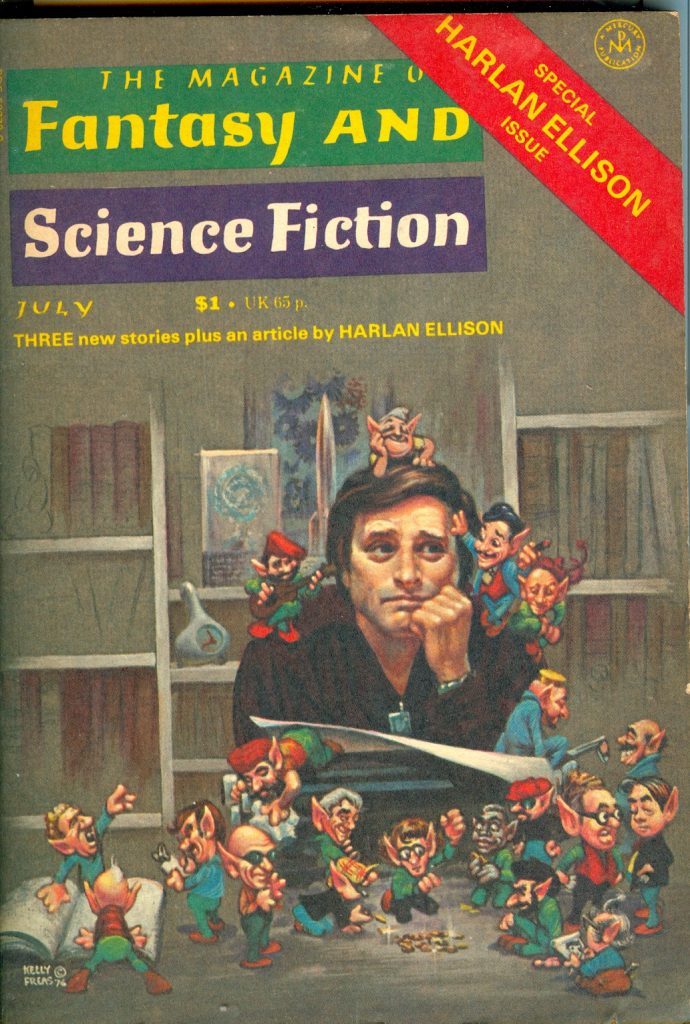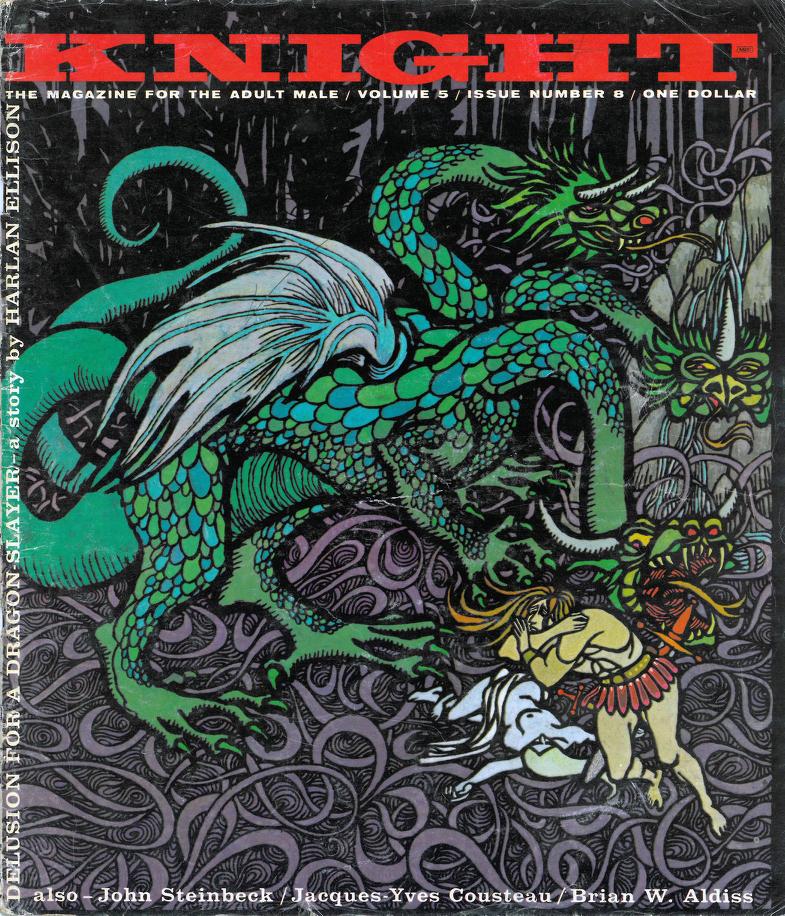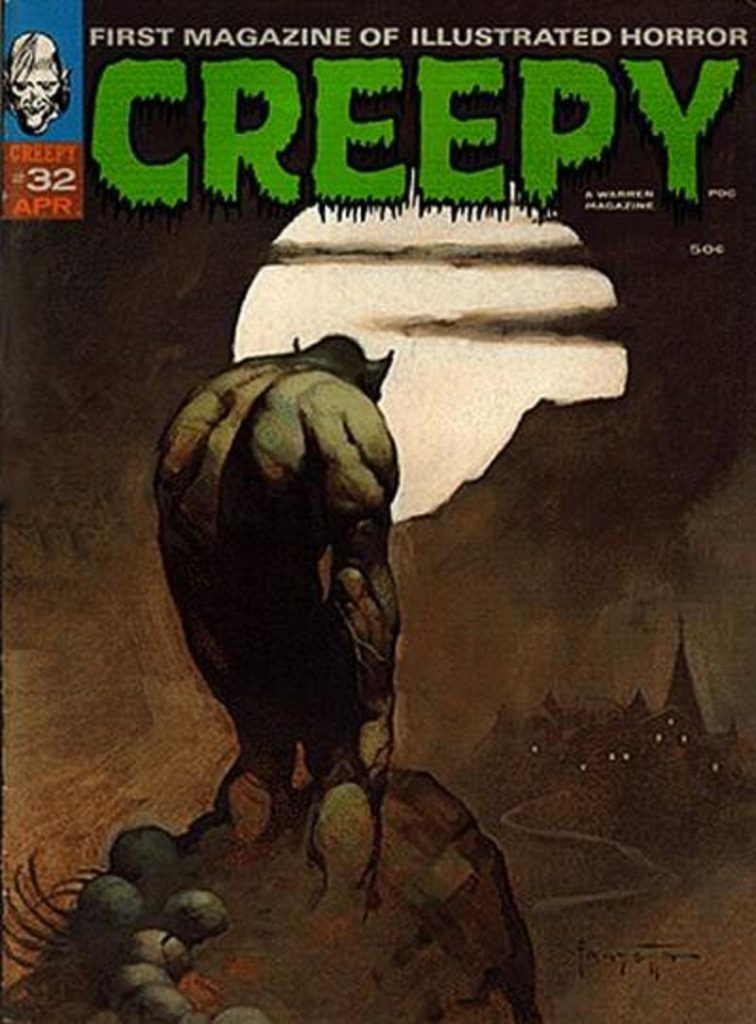 Harlan Ellison died this past Thursday, apparently in his sleep, at age 84. I had just read a few weeks earlier that he had a stroke and was not in good health.
Harlan Ellison died this past Thursday, apparently in his sleep, at age 84. I had just read a few weeks earlier that he had a stroke and was not in good health.
I first became aware of him as our little library had a book called Living in Fear: A History of Horror in the Mass Media by Les Daniels. There was a cover reproduced in the book for an issue of Creepy magazine by Frank Frazetta for a Harlan Ellison story, “Rockgod.” The library had Deathbird Stories in hardback. I read some of the contents but really nothing grabbed me. I also looked Dangerous Visions interested in the Fritz Leiber and Robert Bloch stories but little else.
I had a subscription to The Magazine of Fantasy and Science Fiction for a year in 1977-1978 as a result of a neighbor kid selling magazine subscriptions for school. I did not read those issues when I was in 8th and 9th grades but I did that summer after sophomore year of college. One issue was the special Harlan Ellison issue.
“Jeffty is Five” is about a five year old boy who does not age. The world around him is that of the past. The narrator knew him when he was five and later does things with him. I liked this part of the story:
“In September we enjoyed the first installment of the new Robert E. Howard Conan novel, ISLE OF THE BLACK ONES, in Weird Tales; and in August were only mildly disappointed by Edgar Rice Burroughs’ fourth novella I the Jupiter series featuring John Carter of Barsoom– “Corsairs of Jupiter. But the editor of Argosy All-Story Weekly promised there would be two more stories in the series.”
The story ends with Jeffty dying after getting beaten to a pulp in a movie theater.
That issue of The Magazine of Fantasy and Science Fiction also contained “Working with the Little People.” I can remember a friend of mine in the 1980s saying “That is the only cute story he has ever written.” That issue also has a full page ad for the forthcoming book, The Prince of Sleep, “his first new novel in over fifteen years, a major work of fantasy for 1978.” That book never appeared.
I came away from that Harlan Ellison issue with the perception that it was more about the personality of “Harlan Ellison” than about the prose.
I picked up some Ellison collections over the years but can’t say he was ever a favorite. More of a curiosity. I would hear the stories about Last Dangerous Visions and the unwritten novels. I saw Ellison in summer 1988 in Cleveland at the 50 year anniversary celebration of Superman. I was more interested in talking to Jack Williamson, the man who wrote Golden Blood! James Doohan of Star Trek was there and he looked like he had imbibed some adult beverages. That was entertaining seeing Scotty lit.
It was either Steve Tompkins or James van Hise who mentioned probably in a mailing of the Robert E. Howard United Press Association that Ellison had written a sword and sorcery story. My interest was piqued. Turned out I had it but did not remember it– “Delusion for a Dragon Slayer.”

“Delusion for a Dragon Slayer” first appeared in the magazine Knight in September 1966. There were some lower level imitations of Playboy back then that ran fiction. Ellison also had some stories in Adam.
The story starts out in too much detail how a wrecking ball came to kill William Glazer Griffin. Ellison spent three pages out of 19 just setting it up. Griffin is a middle aged accountant running late on his way to work who decides to take a short cut through an alley.
He wakes up on a ship.
“The body that extended down to the polished deck was a handsome instrument. Composed of the finest bronzed skin tone, the most sculptured anthracite-hard musculature, proportions just the tiniest bit exaggerated, he was lovely and godlike, extremely godlike. Turning slowly, he caught his reflection in the burnished smoothness of a warrior’s bronze shield, hung on a peg at the forecastle. He was Nordic blond, aquiline-nosed, steely-eyed. No one can be that Aryan, was his only thought, flushed with amazement, as he saw the new face molded to the front of his head.”
A wizard tells him this is Heaven, based on his dreams. Heaven is achieved with the intents and ethics of your life. Griffin will get heaven if he can sail the ship through the shoals, overcome the foam-devil that guards the girl, and win her love.
First the ship is wrecked on the reef and sinks with the crew lost. He wakes on the shore. Griffin discovers the girl who is having a liaison with the mist-devil. Ellison engages in 2 pages describing this in faux-pulp overwriting.
Griffin stabs it from behind and then rapes the girl. Cowardice, lust, brute desire were the real substances of his nature. These were things he silently worshipped “at the altar of evil.”
He looks up as seventy-eight-foot dragon opens its mouth and “grinds him to senseless pulp.”
I think this story would have been better had Griffin not been so nebbish but a bastard. Had he been an unscrupulous financier, stock broker, corporate take-over enabler, it would have had more punch.
What did Harlan Ellison have against nebbish accountants?
Someone at a William S. Burroughs board asked Ellison in 2007 if some of the writing was influence by Burroughs.
Ellison replied:
“I do not think Burroughs had much of an impact on me, and I know with absolute certainty there is no conscious resonance with Burroughs in “Delusion for a Dragon-Slayer” where I was VERY consciously channeling both Robert E. Howard and Clark Ashton Smith, who DID have an appreciable thump on my style … at least in that special instance.
So. I like(d) Burroughs, no we never met that I recall, and no, I think what you’re picking up is the influences of Howard and Smith on Burroughs.
Ha! Didn’t think of THAT permutation, did’ja?”
The Aryan reference made me think this story might a case of critique of culture. I also think that Ellison was attracted to Robert E. Howard and Clark Ashton Smith. Ellison wrote some straight up adventure science fiction in the 1950s that have a directness to them. By this time, he would be incapable of writing a straight sword and sorcery story. The only way he could anything approximating sword and sorcery would be to invert it. The near constant gamma rage was Ellison’s trademark by this point.
I see this sort of cognitive dissonance with millennials all the time.
Someone said to me that Ellison was writing a parody of bad sword and sorcery. This story actually predates the first Lancer Conan paperback by a month. The big sword and sorcery boom was not launched yet. Ellison did take a stab at Lin Carter in a review of Harry Harrison and Leon Stover’s Stonehenge in 1974 when he said this book was no Thongor at the Mounds of Venus. Perhaps Harlan and Lin’s paths crossed and not in a good way.
So, “Delusion for a Dragon Slayer” is a curiosity. The story could have been better. Last night when rereading the story, my copy of the Dell paperback edition of Deathbird Stories split in two. The book is 42 years old now. I picked it up used somewhere along the way. There is some sort of symbolism somewhere.

Ellison as a columnist caught my attention far more than Ellison’s short stories. I still remember Xenogenesis and before you can educate, you first must entertain. Can’t say the same about his fiction.
I read Jeffty Is Five a good while ago and I mostly remember thinking that the ending, the idea that the ONLY way to deal with a cute little boy that never ages is to murder him, was just…dumb. I liked Ellison’s Star Trek episode, though (although it seems like he didn’t).
Reading Harlan Ellison was one of those ‘the emperor has no clothes’ moments for me.
I always found his stuff too self-aware, if that is the correct term. Too irreverent for the sake of irreverence. Like he knew, “I’m Harlan Ellison and I have a reputation to uphold, people expect my stories to throw crazy crap at them (which isn’t necessarily imaginative) and throw dung on sacred cows.”
For a time, there were the Big Two— Heinlein and A. E. van Vogt. Van Vogt would write over a million words (mostly for John W. Campbell’s ASTOUNDING) from 1939 to 1950.
Mr. “Mundane SF” (read Damon Knight) launched his career with a 1945 takedown of van Vogt, ‘The World of van Vogt’ which includes the line “…he is a pygmy who has learned to operate an overgrown typewriter.” Of course, van Vogt took this with his usual good grace and humor but Knight’s sneering (and smearing) critique haunted and hampered van Vogt for the rest of his life.
Ellison knew van Vogt personally, and was a staunch defender of both the man and the writer. It was Mr. Ellison who penned the Alfred Elton van Vogt tribute, “Van is Here, But Van is Gone.”
I leave it for John C. Wright to tie these three threads together, in his blog post from ten years ago-
http://www.scifiwright.com/2008/11/van-vogt-was-the-wellspring-of-wonder/comment-page-1/
Emmett: Ellison tackling sword & sorcery around 1955-57, perhaps for SCIENCE FICTION ADVENTURES would have been more interesting. The character of “Harlan Ellison” would not have been created yet. Yes, the Emperor has no cloths is a good description.
My experiences with Harlan appear to be different from those of the others who are commenting. His collection PARTNERS IN WONDER was the first book of modern (written by living writers) science fiction by someone not named “Bradbury” that I read. Yeah, I bought it because it had a story by Robert Bloch, but I was favorably impressed by the other stories included. This led me to buy DANGEROUS VISIONS, and the introductory/interstitial essays were for me quite illuminating. In short order I read all of his work that I could find. Although I still enjoy mil sf and the older stuff influenced by Heinlein, I can also enjoy literary sf that isn’t so caught up in staring at the author’s naval, and Harlan was the perfect example of the right way to do it. Yes, he had a rep similar to that held by Hunter S. Thompson, right down to a Magnum fetish (I do not refer to champagne), but since I also liked Thompson this wasn’t an issue. Flash forward to my emergence from the gafiation necessitated by my military service: Harlan is one of the first writers with whom I reacquainted myself, and he held up. I met him at DragonCon in 1998, and found him to be quite nice so long as one observed the rules. Later on I was the receipient of some of his early morning phone calls, related to my CAS research, which I enjoyed. I sent him a copy of the Arkham edition of CAS’s letters, and he signed my copy of DEATHBIRD STORIES. I still appreciate Harlan’s work, and think that it will stand the test of time, like that of his friend Fritz Leiber. We’re all diminished by his passing. He was also a big CAS booster, as the forthcoming documentary from Darin Coelho Spring shall show.
Dangerous Visions is something, all right. It contains some of the best AND worst stories ever published.
Ellison seemed to do all right with the ladies. Not a gamma. Some of his stories pack an emotional wallop like nothing else in the genre. He was a master of short story writing and had a genuine appreciation for the old masters of the pulp era. On the other hand, he has a lot of unresolved childhood issues and a seething contempt for middle-class America. I hate to think what it did to my mindset when I was a disgruntled teenager.
I liked Harlan Ellison. Sad to hear of his passing. I thought he’d be around another 10 years just to “F-you!” someone who said he’d not live past 30 due to his drinking alone.
I noticed someone use Vox’s terminology – don’t forget there’s the “Sigma” male too. IMO if Vox’s pigeonholing of people into a chicken like pecking order is right, Mr Ellison is probably one of the best examples of such a person the one that could be the Alpha but hates the whole racket and successfully subverts it.
Total pattern of it – oppression, defiance, avoidance, eventual subversion of the “System”, ‘Enemies’ whatever.
From the Glass Teat he talked about his youth – not nice. He was a JEW in a time when it was still fashionable to hate them and mock them openly. Only in the current lifetime due to them buying out most of the media and flooding all the “Oy, vey, you know there was Holocaust? very bad!” stuff did it become unfashionable to openly hate Jews in general.
Well, he LOVED his youth. Gangs of four or five kids, most bigger than them… It was their parents complaining how viciously he beat them. A sweet blonde girl following him around trying to turn him to Jesus scared him though…
And he tried and left more things than most people do in their lifetime, from Dynamite truck driver to Soldier.
Started writing, and to understate incredibly prolific and even that might me some attitude thing – From the Wikipedia page – Ellison attended Ohio State University for 18 months (1951–53) before being expelled. He said the expulsion was for hitting a professor who had denigrated his writing ability, and over the next twenty or so years he sent that professor a copy of every story he published”””””
My first Ellison story was “Repent, Harlequin! said the TickTockMan” read in school and no it wasn’t one that the teacher got fired for it.
I loved Star Trek but never read the credits, lots of stuff of his I was exposed to but didn’t know it till later.
Of course when I started reading scifi/fantasy I ended up going through his dangerous visions and stuff. I liked the graphic adaptations of some of his work, like “Friend of the Enemy” and “Run for the Stars” in Epic Illustrated. “Quicktime” in the Dark Horse one was good also.
Some Gems I’ll point out are again the “Glass Teat” series, done as a column for East Village Other. Imagine brilliant journalistic look into the flaws and cracks in society without the drugs, but plenty of fear and loathing and ‘eerily prophetic’…
Another cool one of my fav possessions is an actual “Underground Comic” he had a hand in – his “Chocolate Alphabet” illustrated by Larry Todd. Suggest a run for the used shop just in case Comic Book Guy forgot to mark it up again.